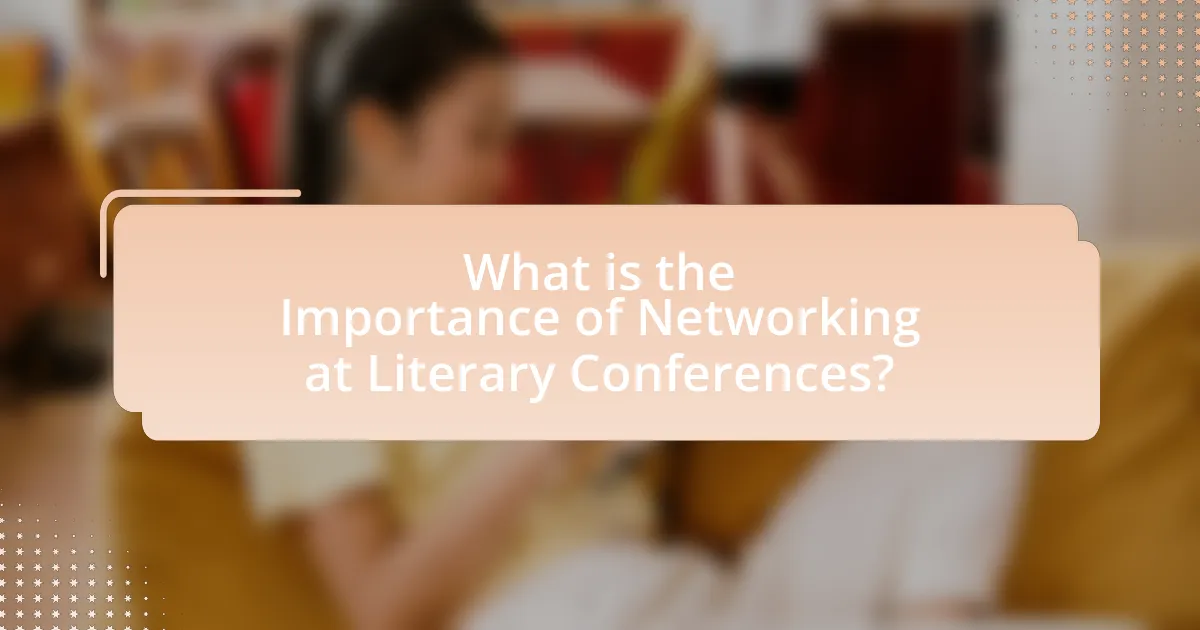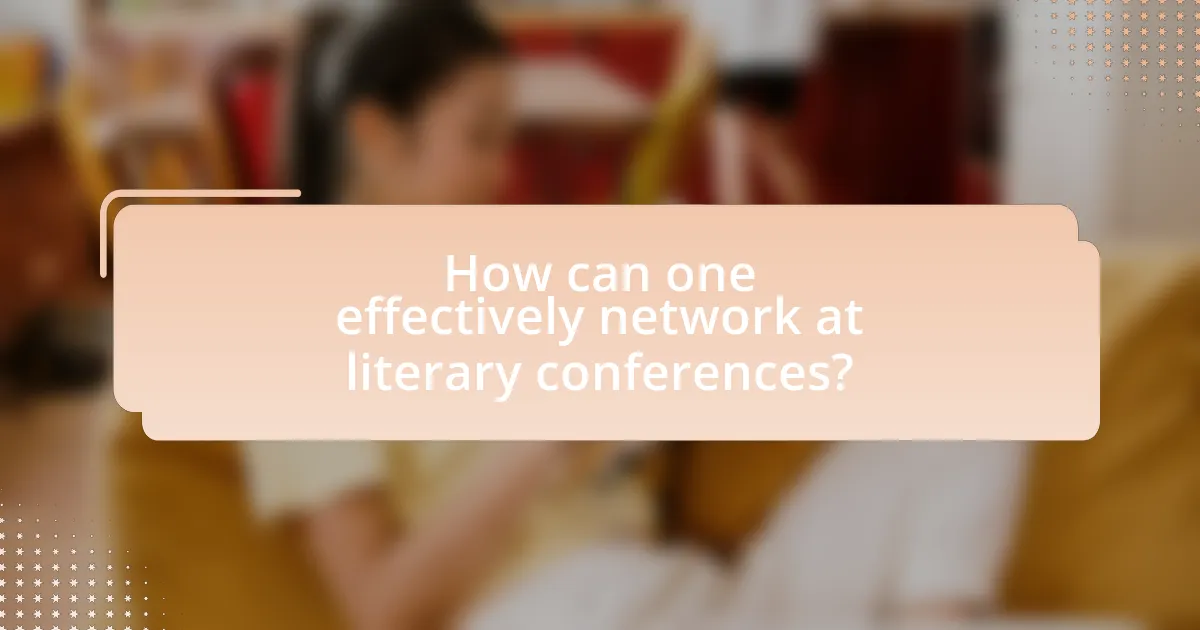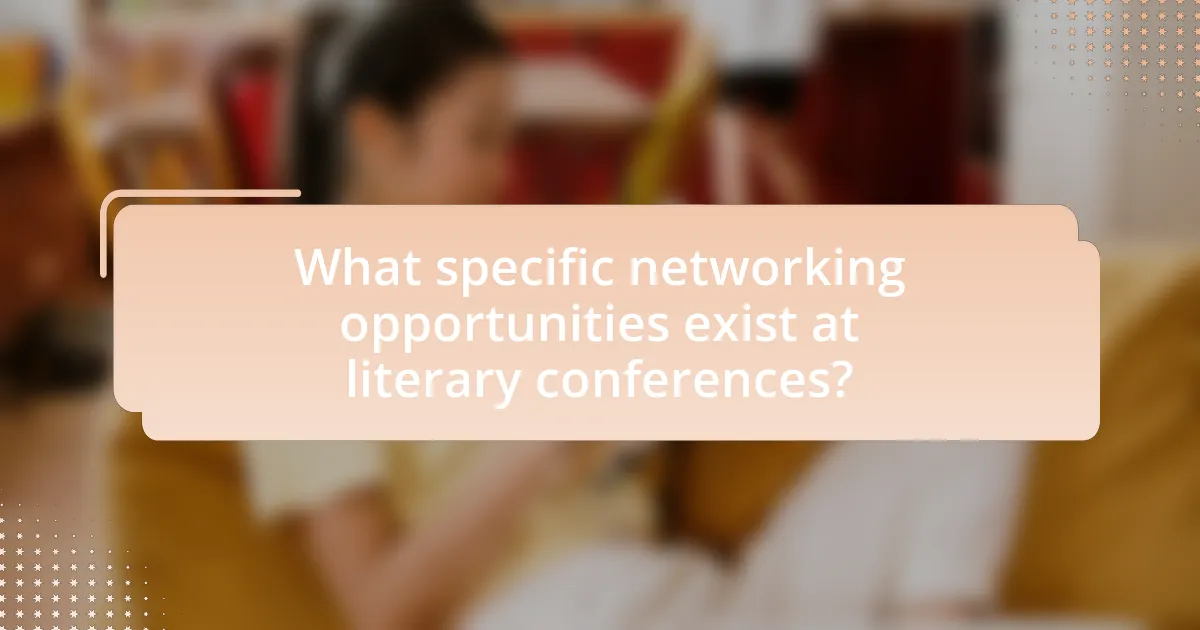Networking at literary conferences is essential for authors, agents, and publishers, as it cultivates professional relationships that can lead to collaboration, mentorship, and publication opportunities. Engaging with peers and industry leaders allows participants to exchange ideas, gain insights into market trends, and receive valuable feedback on their work. Research indicates that a significant percentage of literary professionals attribute their career advancements and publishing successes to networking, highlighting its critical role in the literary community. The article explores the various networking opportunities available at these conferences, effective strategies for building connections, and the impact of networking on career growth and visibility within the industry.

What is the Importance of Networking at Literary Conferences?
Networking at literary conferences is crucial for authors, agents, and publishers as it fosters professional relationships that can lead to collaboration, mentorship, and opportunities for publication. Engaging with peers and industry leaders allows participants to exchange ideas, gain insights into market trends, and receive feedback on their work. According to a survey by the Association of Authors’ Representatives, 70% of literary agents reported that they find new clients through networking at conferences. This statistic underscores the tangible benefits of building connections in the literary community, enhancing career prospects and creative growth.
Why is networking essential for writers and literary professionals?
Networking is essential for writers and literary professionals because it facilitates connections that can lead to opportunities for collaboration, publication, and career advancement. By engaging with peers, industry leaders, and potential mentors, writers can gain insights into market trends, receive feedback on their work, and discover avenues for getting published. For instance, a study by the Association of Writers & Writing Programs found that 70% of writers attribute their success to networking, highlighting its critical role in professional development.
What opportunities does networking provide at literary conferences?
Networking at literary conferences provides opportunities for authors, agents, and publishers to establish professional relationships that can lead to collaborations, mentorships, and publishing deals. These interactions facilitate the exchange of ideas and resources, enhancing participants’ visibility within the literary community. For instance, a survey by the Association of Writers & Writing Programs (AWP) found that 70% of attendees reported making valuable connections that contributed to their career advancement. Such networking opportunities are crucial for gaining insights into industry trends and accessing potential readerships.
How does networking influence career advancement in the literary field?
Networking significantly influences career advancement in the literary field by facilitating connections that lead to opportunities for publication, collaboration, and mentorship. Engaging with industry professionals at literary conferences allows writers to showcase their work, gain visibility, and receive feedback, which can enhance their credibility and marketability. For instance, a study by the Association of Writers & Writing Programs found that 70% of writers who actively networked reported increased chances of getting published compared to those who did not. This demonstrates that building relationships within the literary community is crucial for career growth and success.
What are the key benefits of networking at literary conferences?
Networking at literary conferences provides essential opportunities for authors, agents, and publishers to connect, collaborate, and enhance their careers. These events facilitate the exchange of ideas, leading to potential partnerships and mentorships that can significantly impact an individual’s writing journey. Additionally, networking allows participants to gain insights into industry trends and best practices, which can inform their work and marketing strategies. According to a study by the Association of Authors’ Agents, 70% of authors reported that networking at conferences led to valuable professional relationships that contributed to their success.
How does networking enhance collaboration among writers?
Networking enhances collaboration among writers by facilitating connections that lead to shared ideas, resources, and opportunities for joint projects. When writers engage with one another at literary conferences, they can exchange feedback, co-create content, and support each other’s work, which fosters a collaborative environment. Research indicates that 70% of writers who network report increased creative output and collaboration opportunities, demonstrating the tangible benefits of these interactions.
What role does networking play in gaining visibility and exposure?
Networking plays a crucial role in gaining visibility and exposure by facilitating connections between individuals and organizations within the literary community. These connections often lead to opportunities for collaboration, promotion, and sharing of resources, which can significantly enhance an individual’s or a work’s visibility. For instance, authors who network at literary conferences can meet agents, publishers, and fellow writers, increasing their chances of being recognized and promoted within the industry. Research indicates that 85% of jobs are filled through networking, highlighting its effectiveness in creating opportunities and visibility.

How can one effectively network at literary conferences?
To effectively network at literary conferences, one should actively engage with attendees through meaningful conversations and strategic participation in events. This involves preparing an elevator pitch to succinctly introduce oneself and one’s work, attending workshops and panels to meet like-minded individuals, and utilizing social media platforms to connect before and after the event. Research indicates that 70% of jobs are found through networking, highlighting the significance of building relationships in the literary field. Engaging in discussions, asking questions, and following up with contacts post-conference can further solidify these connections, making networking not just beneficial but essential for career advancement in literature.
What strategies can be employed for successful networking?
Successful networking can be achieved through strategies such as actively engaging in conversations, following up with contacts, and leveraging social media platforms. Engaging in conversations at literary conferences allows individuals to establish rapport and share insights, which can lead to meaningful connections. Following up with contacts after the event reinforces relationships and demonstrates professionalism, increasing the likelihood of future collaborations. Additionally, utilizing social media platforms like LinkedIn and Twitter enables individuals to maintain connections and expand their network beyond the conference setting. Research indicates that 85% of jobs are filled through networking, highlighting the effectiveness of these strategies in building professional relationships.
How can attendees prepare for networking opportunities?
Attendees can prepare for networking opportunities by researching the event and its participants in advance. This preparation allows attendees to identify key individuals they wish to connect with, understand their backgrounds, and formulate relevant conversation starters. According to a study by the Harvard Business Review, effective networking is significantly enhanced by prior knowledge of attendees, as it fosters more meaningful interactions and increases the likelihood of establishing valuable connections.
What are the best practices for initiating conversations?
The best practices for initiating conversations include approaching individuals with a friendly demeanor, making eye contact, and starting with open-ended questions. These techniques create a welcoming atmosphere and encourage dialogue. Research indicates that open-ended questions, such as “What brings you to this conference?” foster deeper engagement and connection, as they invite the other person to share their thoughts and experiences. Additionally, using active listening skills, such as nodding and summarizing what the other person says, enhances the interaction and shows genuine interest, which is crucial in networking environments like literary conferences.
What common mistakes should be avoided while networking?
Common mistakes to avoid while networking include failing to prepare, not listening actively, and being overly self-promotional. Preparation is crucial; individuals should research attendees and have clear objectives for their interactions. Active listening fosters genuine connections, while excessive self-promotion can alienate potential contacts. According to a study by the Harvard Business Review, effective networking relies on building relationships rather than merely exchanging business cards, emphasizing the importance of meaningful engagement over superficial interactions.
How can over-enthusiasm hinder networking efforts?
Over-enthusiasm can hinder networking efforts by overwhelming potential connections and creating discomfort. When individuals exhibit excessive eagerness, they may dominate conversations, making it difficult for others to engage or express their own thoughts. This behavior can lead to perceptions of insincerity or desperation, which can deter others from forming meaningful relationships. Research indicates that effective networking relies on balanced interactions, where both parties feel valued and heard. Therefore, maintaining a moderate level of enthusiasm is crucial for fostering genuine connections at literary conferences.
What are the pitfalls of not following up after the conference?
Not following up after a conference can lead to missed opportunities for collaboration and relationship building. When attendees neglect to reconnect, they risk losing valuable contacts that could lead to future projects, partnerships, or mentorships. Research indicates that 80% of business success comes from networking, highlighting the importance of maintaining connections made during events. Additionally, without follow-up, individuals may be forgotten, diminishing their chances of being remembered for future opportunities. This lack of engagement can also result in a perception of disinterest, which can harm one’s professional reputation within the literary community.

What specific networking opportunities exist at literary conferences?
Literary conferences offer specific networking opportunities such as panel discussions, workshops, and author signings. These events facilitate direct interaction between writers, agents, and publishers, allowing attendees to exchange ideas and establish professional relationships. For instance, during panel discussions, participants can engage with industry experts, while workshops provide hands-on experiences that foster collaboration. Additionally, author signings create informal settings for networking, where aspiring writers can connect with established authors. These opportunities are crucial for building a professional network in the literary field, as evidenced by the fact that many successful authors attribute their career advancements to connections made at such conferences.
What types of events facilitate networking at these conferences?
Conferences facilitate networking through various structured events such as panel discussions, workshops, and social gatherings. Panel discussions allow attendees to engage with industry experts, fostering connections through shared interests and insights. Workshops provide hands-on experiences that encourage collaboration and interaction among participants, enhancing relationship-building opportunities. Social gatherings, including receptions and informal meet-ups, create relaxed environments where attendees can network organically, often leading to meaningful professional relationships. These events are designed to maximize interaction, making them essential for effective networking at literary conferences.
How do panel discussions and workshops promote networking?
Panel discussions and workshops promote networking by creating structured environments where participants can engage with industry professionals and peers. These formats facilitate direct interaction through Q&A sessions, group activities, and informal discussions, allowing attendees to share ideas and establish connections. Research indicates that 70% of professionals find networking opportunities at conferences through such interactive sessions, highlighting their effectiveness in fostering relationships.
What role do social events play in building connections?
Social events play a crucial role in building connections by providing opportunities for individuals to interact face-to-face in a relaxed environment. These gatherings facilitate networking, allowing participants to share ideas, collaborate, and establish professional relationships. Research indicates that 85% of jobs are filled through networking, highlighting the significance of personal connections made during such events. Additionally, social events foster a sense of community, which can lead to long-lasting partnerships and collaborations in various fields, including literature.
How can networking lead to publishing opportunities?
Networking can lead to publishing opportunities by facilitating connections between writers and industry professionals, such as editors and agents. These relationships often result in referrals, collaborations, and insights into the publishing process. For instance, attending literary conferences allows authors to meet influential figures who can provide valuable feedback on their work or recommend them to publishers. According to a study by the Association of Authors’ Agents, 70% of authors reported that networking significantly impacted their chances of getting published. This demonstrates that building a professional network is crucial for accessing publishing opportunities.
What connections are most valuable for aspiring authors?
The most valuable connections for aspiring authors are those with established authors, literary agents, and editors. Established authors can provide mentorship and insights into the publishing process, while literary agents are crucial for representing authors’ work and navigating contracts. Editors offer feedback that can enhance writing quality and increase the chances of publication. Networking at literary conferences facilitates these connections, as events often feature panels, workshops, and opportunities for one-on-one interactions, allowing aspiring authors to build relationships that can significantly impact their careers.
How can networking help in finding literary agents or publishers?
Networking can significantly aid in finding literary agents or publishers by facilitating direct connections and fostering relationships within the publishing industry. Engaging with industry professionals at literary conferences allows authors to present their work, receive feedback, and gain insights into the preferences of agents and publishers. According to a survey by the Association of Authors’ Representatives, 70% of literary agents reported that they prefer to meet authors in person before considering their submissions. This statistic underscores the value of networking, as personal interactions can lead to opportunities that cold submissions often do not provide. Additionally, networking can lead to referrals; established authors or industry contacts may recommend emerging writers to agents or publishers, further enhancing the chances of representation or publication.
What are some practical tips for effective networking at literary conferences?
To effectively network at literary conferences, attendees should engage in active listening and meaningful conversations. This involves approaching fellow participants with genuine interest, asking open-ended questions, and sharing relevant experiences to foster connections. Additionally, utilizing social media platforms like Twitter or LinkedIn to follow up with contacts post-conference can reinforce relationships. Research indicates that 85% of jobs are filled through networking, highlighting the importance of building professional relationships in the literary field.
How can one create a memorable personal pitch?
To create a memorable personal pitch, one should focus on clarity, brevity, and a unique value proposition. A clear pitch articulates who you are, what you do, and what makes you different in a concise manner, ideally within 30 seconds. Brevity ensures that the listener remains engaged, while a unique value proposition highlights your distinct skills or experiences that resonate with the audience. Research indicates that pitches that include a personal story or relatable element are more likely to be remembered, as they create an emotional connection. For instance, a study by the University of Pennsylvania found that storytelling in pitches increases retention by up to 65%.
What tools can assist in maintaining connections post-conference?
Tools that can assist in maintaining connections post-conference include networking apps, social media platforms, and email marketing services. Networking apps like LinkedIn facilitate ongoing professional relationships by allowing users to connect, share updates, and engage with each other’s content. Social media platforms, such as Twitter and Facebook, enable participants to follow up on discussions, share insights, and maintain visibility within their networks. Email marketing services, like Mailchimp, help in sending newsletters or updates to contacts, ensuring that connections remain informed and engaged. These tools are effective because they provide structured ways to keep communication lines open and foster relationships beyond the initial conference interaction.